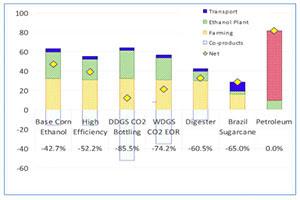A recently released study finds that a significant portion of U.S.-produced corn ethanol will likely meet Japan’s 50 percent greenhouse gas (GHG) reduction threshold over gasoline, supporting the case for that fuel’s competitiveness and its sustainability compared to other fuel sources.
These results will help dispel myths about U.S. ethanol and help make the case for opening the door for U.S. ethanol in the Japanese market. In particular, the study will help show key Japanese government officials and industry stakeholders that U.S. corn ethanol meets Japan’s rigorous international sustainability requirements.
The ongoing efficiency improvements in corn ethanol production, an increased number of co-products from that production and improvements in U.S. corn cultivation practices have resulted in significant reductions in ethanol’s greenhouse gas life cycle emissions and are widening its environmental advantage over petroleum, according to the study, authored by Dr. Steffen Mueller, principal economist at the University of Illinois at Chicago Energy Resources Center, and Stefan Unnasch, managing director of Life Cycle Associates.
This is important as Japan has put into place a requirement that all biofuels must reduce greenhouse gas by 50 percent, and Japanese regulators will decide whether or not to include U.S. corn ethanol in Japan’s biofuel policy in the spring of 2017 for implementation in 2018.
The information in the new study will be critical to showing Japanese policymakers and industry that they can supply their ethyl tert-butyl ether (ETBE) needs using U.S. corn ethanol as a component in its production. Currently, only sugarcane ethanol, largely from Brazil, meets Japanese standards developed 10 years ago.
“As one of the world’s largest fuel markets and a major user of ETBE, it would greatly benefit Japan to have a wider range of choices in what ethanol is used in their ETBE production,” said Michael Dwyer, chief economist for the U.S. Grains Council, who focuses on ethanol export strategy.
“With U.S. ethanol significantly less expensive than Brazilian ethanol, having U.S. ethanol qualified for inclusion in Japan’s policy should reduce the cost of purchasing ETBE from the U.S. or producing ETBE in Japan from imported U.S. ethanol.”
The Council and its partners, the Renewable Fuels Association (RFA), Growth Energy and the U.S. Department of Agriculture, have been engaging with the Japanese fuel industry and Japanese policymakers to showcase the value of utilizing U.S. corn ethanol in the fuel supply as part of a global market development effort to promote usage around the world. Other target markets include Mexico, China, India, the Philippines and Peru.
These groups will continue their work in the future through workshops, seminars, trade missions and relationship building in Japan to help overcome barriers uncovered during previous market assessments including outdated views on U.S. ethanol sustainability. Ultimately, these activities aim to encourage Japanese ethanol importers and end-users to become steady importers of U.S. ethanol.
Click here to read the full study in PDF version.


